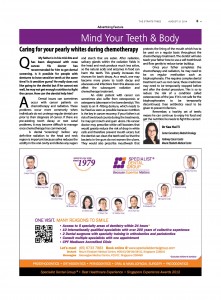 This article first appeared in the August 21st, 2014 issue of The Straits Times Mind Your Body. We have reproduced it for the information of those of you who missed it when it was published.
This article first appeared in the August 21st, 2014 issue of The Straits Times Mind Your Body. We have reproduced it for the information of those of you who missed it when it was published.
Q: My father is in his mid-50s and has been diagnosed with nose cancer. His doctor has recommended for him to get dental screening. Is it possible for people with dentures to have sensitive teeth at the same time? Is it sensitive gums? He really does not like going to the dentist but if he cannot eat well, he may not get enough nutrition to fight the cancer. How can the dentist help him?
A: Dental Issues can sometimes occur with cancer patients on chemotherapy and radiation. These problems occur more commonly when individuals do not undergo regular dental care prior to their diagnosis of cancer. If there are pre-existing tooth decay or root canal problems, it may become difficult to manage once chemotherapy has commenced.
A dental “screening” before any definitive radiation to the head and neck region is important because saliva reduces the acidity in the oral cavity and dilutes any sugars and starch that are eaten. After radiation, salivary glands within the radiation fields in the head and neck produce much less saliva, so the natural acids and enzymes in food can harm the teeth. This greatly increases the chances for tooth decay. As a result, one may become more prone to tooth decay and abscesses and infections from this abscess can affect the subsequent radiation and chemotherapy treatment.
An older patient with cancer can sometimes also suffer from osteoporosis or osteopenia (decrease in the bone density). This leads to an ill -fitting denture, which needs to be fixed as soon as possible because nutrition is the key in cancer recovery. If your father is at risk of low blood counts during the treatments, he may get mouth and gum ulcers. His cancer doctor may prescribe white cell boosters that would greatly reduce the risk of drop in white cells and therefore prevent mouth ulcers; but the dentist can clean the teeth well so that the bacteria in the gum do not worsen the ulcers. They would also prescribe mouthwash that protects the lining of the mouth which has to be used on a regular basis throughout the chemotherapy treatment. The dentist will also teach your father how to use a soft toothbrush and floss gently to reduce tartar buildup.
Once your father completes the chemotherapy and radiation, he may need to be on regular medication such as a bisphosphonate. If he requires complex dental treatment such as root canal, these medicines may need to be temporarily stopped before and after the dental procedure. This is so to reduce the risk of a condition called osteonecrosis of the jaw. If it is not safe for the bisphosphonates to be temporarily discontinued, then antibiotics need to be given to prevent infection.
Remember, a healthy set of teeth; means he can continue to enjoy his food and get the nutrition he needs to fight the cancer!
Senior Consultant, Medical Oncology
Parkway Cancer Centre
Mount Elizabeth Medical Centre






